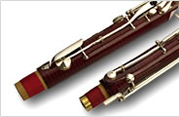Trivia
An Instrument that is Sensitive to Humidity
When European orchestras come to Japan to perform the bassoonists alone remain in their hotel rooms, intently filing their reeds. The problem is that their reeds, made in Europe, are producing a different sound, and a reed appropriate for use in Japan is now needed. This is because the difference in the environment, between the dry air of Europe and high-humidity Japan, has a substantial effect on the woodwind bassoon.
The bassoon is an instrument that is significantly affected by humidity, and in humid periods, such as the rainy season, this humidity can cause the wood to swell, with impacts such as preventing sections of the instrument from being separated, or making it difficult to fit them together during assembly. There are types of bassoons that have yarn wound around the connecting areas of the joints, allowing the yarn to be partially unraveled or rewound to allow adjustment of the thickness of these connecting parts. Such is the extent to which the bassoon can be affected.

A joint wrapped with red yarn
Musical Instrument Guide : Bassoon Contents
Structure
- What Kind of Musical Instrument is a Bassoon?
- A Long Tube that can be Separated
- The Bocal and its Various Functions
- Unique Features of the bassoon, and How to Play
- [Experiment1]Comparing the Sound of Tone Holes cut Obliquely and Perpendicular
- [Experiment2]Encasing the Bore in Various Materials
- Bonus Experiment
How to Play
How the Instrument is Made
Choosing an Instrument
Trivia
- An Instrument that is Sensitive to Humidity
- Sounds from water in the U-tube?
- There's a needle in the bocal?!
- Comments by conductors caused popularity to tumble?
- Bassoon classics - Chamber music works
- Bassoon classics - Concertos
- Is the "contra-fagotto" a contrabassoon?
- What is the best tool to file a reed?
